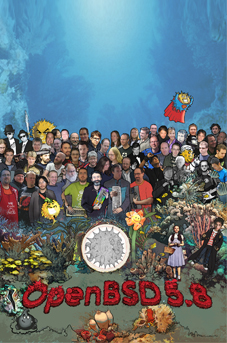Quick installer information for people familiar with OpenBSD, and the
use of the "disklabel -E" command. If you are at all confused when
installing OpenBSD, read the relevant INSTALL.* file as listed above!
OpenBSD/i386:
The OpenBSD/i386 release is on CD1.
Boot from the CD to begin the install - you may need to adjust
your BIOS options first.
If your machine can boot from USB, you can write install58.fs or
miniroot58.fs to a USB stick and boot from it.
If you can't boot from a CD, floppy disk, or USB,
you can install across the network using PXE as described in
the included INSTALL.i386 document.
If you are planning on dual booting OpenBSD with another OS, you will need to
read INSTALL.i386.
OpenBSD/amd64:
The OpenBSD/amd64 release is on CD2.
Boot from the CD to begin the install - you may need to adjust
your BIOS options first.
If your machine can boot from USB, you can write install58.fs or
miniroot58.fs to a USB stick and boot from it.
If you can't boot from a CD, floppy disk, or USB,
you can install across the network using PXE as described in the included
INSTALL.amd64 document.
If you are planning to dual boot OpenBSD with another OS, you will need to
read INSTALL.amd64.
OpenBSD/macppc:
Burn the image from a mirror site to a CDROM, and power on your machine
while holding down the C key until the display turns on and
shows OpenBSD/macppc boot.
Alternatively, at the Open Firmware prompt, enter boot cd:,ofwboot
/5.8/macppc/bsd.rd
OpenBSD/sparc64:
Put CD3 in your CDROM drive and type boot cdrom.
If this doesn't work, or if you don't have a CDROM drive, you can write
CD3:5.8/sparc64/floppy58.fs or CD3:5.8/sparc64/floppyB58.fs
(depending on your machine) to a floppy and boot it with boot
floppy. Refer to INSTALL.sparc64 for details.
Make sure you use a properly formatted floppy with NO BAD BLOCKS or your install
will most likely fail.
You can also write CD3:5.8/sparc64/miniroot58.fs to the swap partition on
the disk and boot with boot disk:b.
If nothing works, you can boot over the network as described in INSTALL.sparc64.
OpenBSD/alpha:
Write 5.8/alpha/floppy58.fs or
5.8/alpha/floppyB58.fs (depending on your machine) to a diskette and
enter boot dva0. Refer to INSTALL.alpha for more details.
Make sure you use a properly formatted floppy with NO BAD BLOCKS or your install
will most likely fail.
OpenBSD/armish:
After connecting a serial port, Thecus can boot directly from the network
either tftp or http. Configure the network using fconfig, reset,
then load bsd.rd, see INSTALL.armish for specific details.
IOData HDL-G can only boot from an EXT-2 partition. Boot into linux
and copy 'boot' and bsd.rd into the first partition on wd0 (hda1)
then load and run bsd.rd, preserving the wd0i (hda1) ext2fs partition.
More details are available in INSTALL.armish.
OpenBSD/hppa:
Boot over the network by following the instructions in INSTALL.hppa or the
hppa platform page.
OpenBSD/landisk:
Write miniroot58.fs to the start of the CF
or disk, and boot normally.
OpenBSD/loongson:
Write miniroot58.fs to a USB stick and boot bsd.rd from it
or boot bsd.rd via tftp.
Refer to the instructions in INSTALL.loongson for more details.
OpenBSD/luna88k:
Copy 'boot' and 'bsd.rd' to a Mach or UniOS partition, and boot the bootloader
from the PROM, and then bsd.rd from the bootloader.
Refer to the instructions in INSTALL.luna88k for more details.
OpenBSD/octeon:
After connecting a serial port, boot bsd.rd over the network via DHCP/tftp.
Refer to the instructions in INSTALL.octeon for more details.
OpenBSD/sgi:
To install, burn cd58.iso on a CD-R, put it in the CD drive of your
machine and select Install System Software from the System Maintenance
menu. Indigo/Indy/Indigo2 (R4000) systems will not boot automatically from
CD-ROM, and need a proper invocation from the PROM prompt.
Refer to the instructions in INSTALL.sgi for more details.
If your machine doesn't have a CD drive, you can setup a DHCP/tftp network
server, and boot using "bootp()/bsd.rd.IP##" using the kernel matching your
system type. Refer to the instructions in INSTALL.sgi for more details.
OpenBSD/socppc:
After connecting a serial port, boot over the network via DHCP/tftp.
Refer to the instructions in INSTALL.socppc for more details.
OpenBSD/sparc:
Boot from one of the provided install ISO images, using one of the two
commands listed below, depending on the version of your ROM.
ok boot cdrom 5.8/sparc/bsd.rd
or
> b sd(0,6,0)5.8/sparc/bsd.rd
If your SPARC system does not have a CD drive, you can alternatively boot from floppy.
To do so you need to write floppy58.fs to a floppy.
For more information see this page.
To boot from the floppy use one of the two commands listed below,
depending on the version of your ROM.
ok boot floppy
or
> b fd()
Make sure you use a properly formatted floppy with NO BAD BLOCKS or your install
will most likely fail.
If your SPARC system doesn't have a floppy drive nor a CD drive, you can either
setup a bootable tape, or install via network, as told in the
INSTALL.sparc file.
OpenBSD/vax:
Boot over the network via mopbooting as described in INSTALL.vax.
OpenBSD/zaurus:
Using the Linux built-in graphical ipkg installer, install the
openbsd58_arm.ipk package. Reboot, then run it. Read INSTALL.zaurus
for a few important details.
